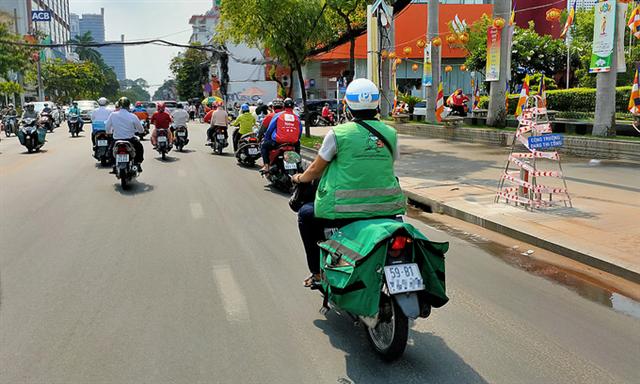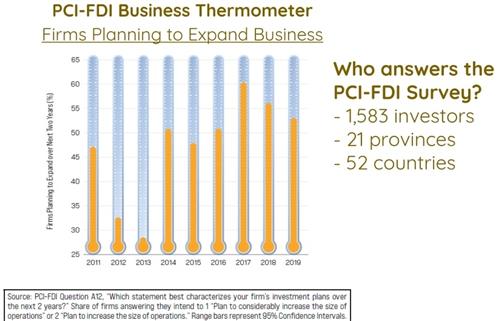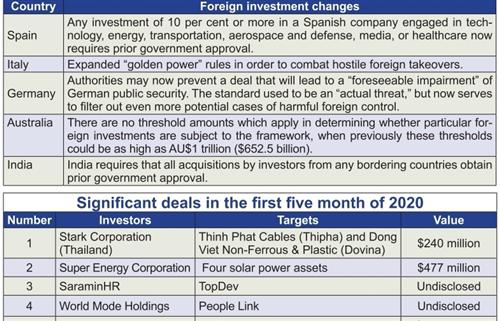Has Covid-19 subverted the traditional Vietnamese consumer?
Has Covid-19 subverted the traditional Vietnamese consumer?
The Covid-19 pandemic has introduced many traditional Vietnamese consumers to the convenience of online shopping and they might not return to old ways.
A delivery man in Saigon on May 12, 2020. Photo by VnExpress/Vien Thong.
|
Hanh could not have imagined how drastically long-standing habits can change in just a month.
The District 8 resident in Ho Chi Minh City, more than 50 years old, is used to handpicking fish, meat and other things at wet markets or supermarkets, and would not have it any other way.
Just a month later, she has left all groceries shopping in the hands of her two sons, who buy everything via apps and websites.
"Since my children want to limit my going out, I have to get used to buying goods online via phones ... they handle paying and receiving the goods."
Nguyen Ngoc Dung, vice president of Vietnam E-Commerce Association (VECOM), said that the outbreak has introduced to e-commerce a large number of consumers who had earlier not been interested in online shopping and e-payment.
"The outbreak forced people who would normally go out to shop at a nearby supermarket to make purchases online. Once they have done it, they feel 'happy' that they do not have to wear a face mask and stay two meters apart when queuing up," Dung said.
Milk, instant noodles, soy milk, soda and pork sausages were the top five most searched items of GrabMart, an online supermarket, in April, when the stay-at-home advisory was still in force.
GrabMart was launched on March 23 to exploit the online grocery shopping trend. In its second week, the company revealed that orders surged by 91 percent over the previous week, with sales reaching a peak on March 31.
Meanwhile, Shopee Vietnam believes that consumers switching to online shopping for all daily needs is one of the four big e-commerce trends in 2020.
On this popular platform, the total time Vietnamese customers spent shopping in a week increased by more than 25 percent in the wake of the pandemic as people looked to satisfy their daily life, work, home and entertainment needs. The most popular products included makeup remover, smartphones, milk, diapers, pots and pans.
Tran Tuan Anh, managing director of Shopee Vietnam, said: "2020 has changed the way of living, working and shopping online."
Malaysian market research firm iPrice said that data compiled in the first three months of this year on Vietnam's e-commerce market showed that staple goods, including groceries, which are normally not key products, had become very popular.
In March alone, the number of online visits to Mobile World's grocery chain Bach Hoa Xanh increased by 49 percent compared to the fourth quarter of last year.
Truong Van Quy, CEO of marketing academy EQVN, said: "During the social distancing period, consumers have picked up online shopping as a new habit, which took businesses a long time to orient. These habits can be retained even after the epidemic."
New schedules, opportunities
With physical shopping, households typically spent money on family and on entertainment during weekends. However, as people, get used to online shopping, this is changing.
Shopee said that in recent months, online shopping activities on the platform have peaked on Wednesdays and Fridays, showing Vietnamese consumers have the habit of completing shopping on the last few days before the weekend. The company also found that new online shopping took place mostly place at 12 p.m. and 9 p.m., which meant users were taking advantage of their lunch break or choosing to shop before going to bed.
The ride-hailing service, Grab, said that its users were tending to place orders with GrabMart more during midweek and weekends. Specifically, the Grab system regularly recorded a spike in orders at 3 p.m. on Tuesday, and at 10 a.m. and 15 p.m. on Saturday.
"These time frames may signify consumers stocking up food or preparing a weekend meal for the family and stocking up food for the next week," the company said.
Shopee also confirmed their customers were using cashless payments in recent months.
According to data from Vietnam’s MOCA Technology and Service Company, the number of first-time users using non-cash payments for Grab in March increased by 22.5 percent compared to the previous month. During the pandemic, the percentage of cashless transactions on the entire Grab platform accounted for 43 percent, 70 percent of which were for GrabMart.
Dung of VECOM said that during the pandemic period, businesses that had not introduced e-commerce early were left behind, while those who had prepared for it but had not launched the service were able to take advantage of the opportunity created by the Covid-19 crisis.
Nguyen Minh Duc, CEO of business consulting firm IM Group, cited date from Google showing the number of online shopping searches in Vietnam increased by 40 percent last month.
"It is an opportunity but also a challenge," Duc said.
It was a view shared by Vu Thi Nhuy Linh, deputy general director of e-commerce site Tiki. She said that while businesses can take advantage of online channels to reach more customers, the lack of infrastructure and knowhow were stiff challenges for many small and medium enterprises.
A recent survey conducted by Tiki found small and medium enterprises were afraid of expanding distribution channels on e-commerce sites, based on three "fears" – the fear of not selling, fear of not being able to manage and fear of losing money.
Dung said that 70 percent of the e-commerce in Vietnam was happening in Hanoi and Ho Chi Minh City and 30 percent in other localities. Therefore, VECOM was working with Tiki and the IM Group to implement a project to support 500,000 enterprises to go digital and develop e-commerce sustainably, he said.
"We will strive together to balance the proportion so e-commerce in Hanoi and Ho Chi Minh cities will account for 50 percent and the remaining provinces and towns will account for the remaining by 2025," Dung said.
Vietnam’s e-commerce market is projected to grow to VND399.5 trillion ($17.3 billion) in 2023 from VND218.3 trillion ($9.4 billion) last year, according to U.K. consulting firm GlobalData.
























